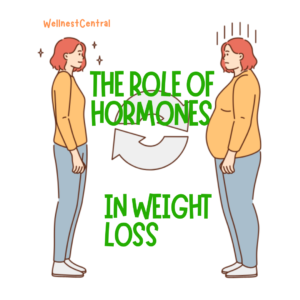Introduction
Are you tired of seeing the same cycle: diets that promise rapid weight loss, yet the pounds seem to creep back on as soon as you stop? If so, you’re not alone. The truth is, many people find themselves in this frustrating cycle. But the good news is that sustainable weight loss is possible. It’s not about finding a quick fix but adopting strategies that help you lose weight and maintain it for the long term. Let’s explore 10 practical and effective ways to kickstart your weight loss journey and keep those results!
1. The Realities of Weight Loss: Why It’s Hard to Keep the Weight Off
Maintaining weight loss is often more challenging than losing it. After months of restrictive dieting, your metabolism might slow down as it adjusts to the lower caloric intake. Plus, there’s the emotional rollercoaster—feelings of deprivation and fatigue can make it tough to stick to your goals.
Common Pitfalls: Quick-fix solutions like extreme calorie restriction, fad diets, and unsustainable exercise plans often backfire. Your body needs nourishment, movement, and a balanced approach to keep the weight off.
2. Effective Strategy #1: Focus on Lifestyle Changes, Not Quick Fixes
Ditch the “All or Nothing” Mindset: Quick-fix diets might offer immediate results, but they rarely last. Instead of banning certain foods or sticking to extreme eating patterns, focus on making small, manageable lifestyle changes. Aim for steady progress, not perfection.
Try This: Swap out sugary drinks for water, add a vegetable to each meal, or find an exercise you genuinely enjoy. These simple shifts create lasting habits and are easier to stick to over time.
3. Effective Strategy #2: Prioritize Mindful Eating
Mindful eating is all about paying attention to your body’s hunger and fullness cues, rather than eating out of habit or emotion. By slowing down and savoring every bite, you naturally eat less and enjoy your meals more.
Try This: Put your fork down between bites and chew thoroughly. Take note of the flavors and textures, and aim to eat without distractions like TV or scrolling on your phone. This approach helps prevent overeating and builds a healthier relationship with food.
4. Effective Strategy #3: Build a Balanced Diet (80/20 Rule)
The “80/20” principle is a practical way to create balance in your diet. Aim to eat nutrient-dense, whole foods (fruits, vegetables, lean proteins, whole grains) 80% of the time. The remaining 20% allows for indulgences, helping you avoid the guilt that comes with “forbidden foods.”
Try This: Your meals could look like this: Breakfast – oatmeal with berries and nuts; Lunch – a large salad with chicken and vinaigrette; Dinner – grilled salmon, quinoa, and veggies. And for dessert, treat yourself to a square of dark chocolate!
5. Effective Strategy #4: Consistent Exercise That You Enjoy
Find activities that make you excited to move! Whether it’s dancing, hiking, yoga, or playing a sport, the key is consistency. Exercise shouldn’t feel like a chore; it should be something that makes you feel good.
Try This: If you’re not a fan of the gym, try activities like walking in nature, swimming, or a fitness class. The best exercise is one you’ll stick to over time.
6. Effective Strategy #5: Strength Training is Key
Cardio alone may not be enough for long-term weight loss. Incorporating strength training helps you build lean muscle mass, which boosts your metabolism and helps burn more calories, even at rest.
Try This: Include 2-3 strength-training sessions per week, focusing on all major muscle groups. Start with bodyweight exercises like squats, lunges, and push-ups, and gradually add weights as you build strength.
7. Effective Strategy #6: Prioritize Sleep and Stress Management
Lack of sleep and chronic stress can sabotage your weight loss goals. When you’re tired or stressed, your body produces hormones that can increase hunger and cravings for high-calorie comfort foods.
Try This: Aim for 7-9 hours of quality sleep per night. Establish a calming bedtime routine—dim the lights, read a book, or practice deep breathing. For stress management, try activities like meditation, journaling, or taking time for hobbies you enjoy.
8. Effective Strategy #7: Track Progress Beyond the Scale
The scale isn’t always the best indicator of your progress. Weight can fluctuate due to many factors (like water retention or muscle gain), and constantly checking can be discouraging.
Try This: Track non-scale victories, like improved energy levels, better mood, looser clothing, and increased fitness. These wins matter just as much—if not more—than a number on a scale.
9. Effective Strategy #8: Surround Yourself with a Supportive Community
Having a support system can make all the difference in your weight loss journey. Whether it’s friends, family, or an online community, surrounding yourself with people who understand your goals helps you stay motivated.
Try This: Find a workout buddy, join a social media support group, or even enlist the help of a health coach or dietitian. Accountability and encouragement can help you overcome tough times.
10. Effective Strategy #9: Be Patient and Forgive Slip-Ups
Weight loss is not linear, and slip-ups are normal. Forgive yourself, learn from your mistakes, and get back on track. Self-compassion is key to sustainable weight loss.
Try This: If you overeat one day, acknowledge it and move on. Remember that one meal doesn’t define your progress. Focus on making healthier choices for your next meal, rather than dwelling on the past.
11. Effective Strategy #10: Stay Hydrated and Manage Portion Sizes
Staying well-hydrated can help control hunger and improve your overall health. Additionally, being mindful of portion sizes prevents overeating.
Try This: Carry a water bottle with you throughout the day to remind you to drink. When it comes to meals, use smaller plates, measure out snacks, and listen to your hunger cues to decide when you’ve had enough.
Conclusion: Making Lasting Change Possible
Weight loss is a journey that requires time, patience, and the right strategies. By making sustainable lifestyle changes, practicing mindful eating, finding enjoyable exercises, and being kind to yourself, you can achieve lasting results. Remember, consistency is key, and every small step counts toward a healthier, happier you.
Call to Action
Start by picking one of these strategies today! Share your progress and let us know which tip resonates most with you. Subscribe to our blog for more sustainable health tips and support on your weight loss journey.
FAQs
- Why is it so hard to keep the weight off? Weight maintenance is challenging due to factors like slowed metabolism, hormonal changes, and returning to old eating habits after restrictive dieting.
- How can I make my weight loss journey sustainable? Focus on lifestyle changes, balance your diet with an 80/20 rule, exercise regularly, prioritize sleep, and practice self-compassion.
- Do I need to count calories to lose weight? While counting calories can be helpful for some, focusing on nutrient-dense foods, portion sizes, and mindful eating can be equally effective without the stress of calorie counting.
- Can I lose weight without going to the gym? Absolutely! Find physical activities you enjoy, such as walking, dancing, or home workouts, to ensure consistent movement.
- How do I stay motivated when results are slow? Track progress beyond the scale, celebrate non-scale victories, and surround yourself with supportive people who encourage you to keep going.




Pingback: 5 Emotional Struggles of Weight Loss and Hair Loss: What You Need to Know to Protect Your Hair - Wellnest Central
Pingback: 7 Shocking Ways How Weight Loss Changes Your Face and Boosts Your Confidence - Wellnest Central
Pingback: 10 Life-Saving High Blood Pressure Herbs That Could Transform Your Heart Health Forever - Wellnest Central